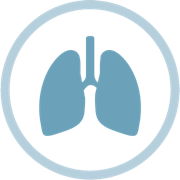For US Healthcare Professionals Only
Managing ALS
Choosing the appropriate clinical interventions and patient strategies can help address functional decline and quality of
life and possibly extend survival times.1

Managing ALS
Choosing the appropriate clinical interventions and patient strategies can help address functional decline and quality of
life and possibly extend survival times.1

Patient Interventions
Interventions That Impact Disease Progression
Survival time may be influenced by a number of factors, including clinical management interventions. Several of these include

Multidisciplinary Care
A multidisciplinary approach to patient care has been proven to help prolong patient survival times.2
A multidisciplinary approach to patient care has been proven to help prolong patient survival times.2

Nutritional Status
Malnutrition affects up to 50% of patients with ALS, as the muscles involved in chewing and swallowing become insufficient.
If patients can still safely chew and swallow, encourage the consumption of high calorie and high protein foods. If food intake is considered unsafe, consider a percutaneous endoscopic gastrostomy (PEG) tube.1
Malnutrition affects up to 50% of patients with ALS, as the muscles involved in chewing and swallowing become insufficient.
If patients can still safely chew and swallow, encourage the consumption of high calorie and high protein foods. If food intake is considered unsafe, consider a percutaneous endoscopic gastrostomy (PEG) tube.1

Respiratory Support
Respiratory failure is the leading cause of death in ALS, so early intervention is mandatory. Noninvasive ventilation (NIV) earlier in disease course has been shown to extend survival times.
If respiratory function declines significantly, tracheostomy or permanent assisted ventilation is often required.1,3
Respiratory failure is the leading cause of death in ALS, so early intervention is mandatory. Noninvasive ventilation (NIV) earlier in disease course has been shown to extend survival times.
If respiratory function declines significantly, tracheostomy or permanent assisted ventilation is often required.1,3

Clinical Treatments
There are a growing number of emerging clinical treatments for ALS.
There are a growing number of emerging clinical treatments for ALS.

Symptom Management
Medications can be recommended to manage symptoms like muscle cramps and fatigue, which may improve the quality of life for some patients.
Medications can be recommended to manage symptoms like muscle cramps and fatigue, which may improve the quality of life for some patients.
Treatment Options
ALS Treatment Options
Currently there are 2 available ALS treatments approved by the Food and Drug Administration.
Ongoing clinical efforts continue to advance our understanding of ALS and its pathophysiology. This research, along with available treatment options, is bringing real promise to those affected by ALS.
Ongoing clinical efforts continue to advance our understanding of ALS and its pathophysiology. This research, along with available treatment options, is bringing real promise to those affected by ALS.
Multidisciplinary Care
Benefits of Multidisciplinary ALS Care2
Research shows that patients who receive multidisciplinary care have a better disease prognosis. If your practice or facility has a range of disciplines and clinical specialists on staff, providing a personalized approach to care has many advantages.
You may also want to refer patients to an ALS clinic. ALS clinics have been proven to help prolong patient survival times versus general neurology clinics.
Patients who attended an ALS clinic experienced a
You may also want to refer patients to an ALS clinic. ALS clinics have been proven to help prolong patient survival times versus general neurology clinics.
Patients who attended an ALS clinic experienced a
- 43.7% decreased risk of death
- 7.5 month increase in average survival time
Finding the Right ALS Center
- ALS Association-certified clinics are nationally located and can be found atwww.alsa.org/community/centers-clinics
- Muscular dystrophy association (MDA) care centers can be found at www.mda.org/services/your-mda-care-center
If an ALS clinic is not accessible in your patients’ geographic region, you can still connect them with a range of clinical specialists in your area.
Consider the benefits of multidisciplinary care.
Role of the Caregiver
As patients become less self-sufficient with declining muscle function, the assistance of a caregiver becomes indispensable to their physical and emotional well-being.
It’s important that patients understand the role and importance of a caregiver and that they have a network of family members and loved ones to rely upon for continued support.
Encourage patients to bring their caregivers to medical consultations. Providing caregivers directly with information on disease activity and progression will give them the firsthand insight they need to make the best possible care decisions.
It’s important that patients understand the role and importance of a caregiver and that they have a network of family members and loved ones to rely upon for continued support.
Encourage patients to bring their caregivers to medical consultations. Providing caregivers directly with information on disease activity and progression will give them the firsthand insight they need to make the best possible care decisions.
References: 1. Predicting survival time in ALS. MDA/ALS Newsmagazine. http://alsn.mda.org/article/predicting-survival-time-als. Published May 2009. Accessed April 13, 2017. 2. Traynor BJ, Alexander M, Corr B, et al. Effect of a multidisciplinary amyotrophic lateral sclerosis (ALS) clinic on ALS survival: a population based study, 1996-2000. J Neurol Neurosurg Psychiatry. 2003;74(9):1258-1261. 3. Amyotrophic lateral sclerosis (ALS) fact sheet. National Institute of Neurological Disorders and Stroke website. https://www.ninds.nih.gov/disorders/Patient-Caregiver-Education/Fact-Sheets/Amyotrophic-Lateral-Sclerosis-ALS-Fact-Sheet. Published June 2013. Accessed April 13, 2017.

